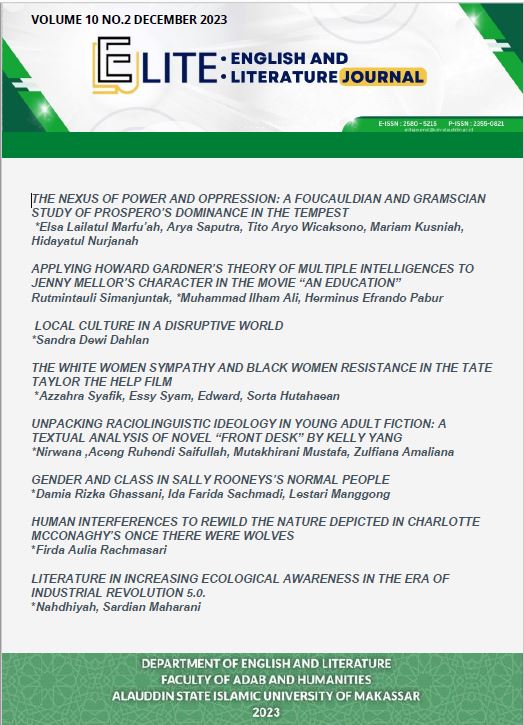Interferensi Manusia untuk Melestarikan Alam pada Novel Karya Charlotte McConaghy Once There Were Wolves
Abstrak
Masalah lingkungan telah menjadi isu serius dalam beberapa dekade terakhir. Dunia telah mulai berubah akibat aktivitas manusia yang mempengaruhi lingkungan alam. Deforestasi, industrialisasi, pembakaran bahan bakar, kelebihan populasi manusia, dan banyak lagi telah memicu perubahan iklim. Dalam novelnya, Once There Were Wolves, Charlotte McConaghy menggambarkan dengan jelas kondisi tersebut. Novel ini mengungkap bagaimana pegunungan tinggi Skotlandia mulai hancur karena populasi rusa yang berlimpah. Mereka memakan tunas-tunas tanaman, sehingga tanaman-tanaman tersebut mati. Oleh karena itu, masyarakat di sana harus mengambil tindakan untuk membantu Pegunungan Tinggi Skotlandia kembali ke keadaan alamiah mereka. Penelitian ini bertujuan untuk mengkaji campur tangan manusia dalam menyelamatkan alam yang rusak seperti yang digambarkan dalam novel tersebut. Penelitian ini merupakan kritik sastra dan menggunakan pendekatan deskriptif kualitatif. Penelitian ini menggunakan teori ekokritik untuk menganalisis upaya manusia dalam membantu alam kembali ke keadaan alamiahnya. Hasil penelitian menunjukkan bahwa campur tangan manusia untuk mengembalikan alam menjadi liar digambarkan melalui tiga tindakan; melepaskan empat belas serigala, menjaga hutan dan vegetasi, dan menanam pohon. Ketiga tindakan pengembalian alam ini efektif memperbaiki alam yang rusak dan meningkatkan kualitas hidup masyarakat setempat.
##plugins.generic.usageStats.downloads##
Referensi
Adek, M. (2022). Slowly but Surely: The Maternal Phase of Sylvia Plath in Her Late Poems. Elite: English and Literature Journal, 9(1), 1-13. DOI: https://doi.org/10.24252/elite.v9i1.28432
Bhushan, V. (2021). An Ecology and Ecocriticism in Amitav Ghosh's "The Hungry Tide ."The Creative Launcher, 5 (6), 134-136. https://doi.org/10.53032/TCL.2021.5.6.18
Bressler, C. E. (2011). Literary Criticism: An Introduction to Theory and Practice. Boston: Pearson Longman.
Broughton, R. K., Bullock, J. M., George, C., Hill, R. A., Hinsley, S. A., Maziarz, M., . . . Pywell, R. F. (2021). Long-term woodland restoration on lowland farmland through passive rewilding. PLoS ONE, 16(6), 1. https://doi.org/10.1371/journal.pone.0252466
Brown, C., Mcmorran, R., & Price, M. F. (2012). Rewilding – A New Paradigm for Nature Conservation in Scotland? Scottish Geographical Journal, 127(4), 288-289. DOI: 10.1080/14702541.2012.666261
Buell, L. (2005). The Future of Environmental Criticism: Environmental Crisis and Literary Imagination. New Jersey: Blackwell Publishing.
Bu¨hne, H. S., Pettorelli, N., & Hoffmann, M. (2022). The Policy Consequences of Defining Rewilding. Springer, 94. https://doi.org/10.1007/s13280-021-01560-8
Chairani, S. H., Mas’ulah, & Setyorini, A. (2019). Relationship Between Human and Animal in Kate DiCamillo’s the Magician’s Elephant. Teaching of English Language and Literature Journal, 7(2), 75-76. DOI: http://dx.doi.org/10.30651/tell.v7i2.3179
Corlett, R. T. (2016). The Role of Rewilding in Landscape Design for Conservation. Springer, 127-128. DOI https://doi.org/10.1007/s40823-016-0014-9
Crist, E., Kopnina, H., Cafaro, P., Gray, J., Ripple, W. J., Safina, C., . . . Piccolo, a. J. (2021). Protecting Half the Planet and Transforming Human Systems Are Complementary Goals. Perspective, 2, 1. doi:https://doi.org/10.3389/fcosc.2021.761292
Fard, S. F. (2016). A Short Introduction to Literary Criticism. International Journal of Humanities and Cultural Studies, 5(4), 330-332.
Garrard, G. (2004). Ecocriticism: The New Critical Idiom. New York: Routledge.
Giffen, R. A., Ryan, C. M., E. P., Pounch, M. A., & Brown, S. (2022). Storing More Carbon by Improving Forest Management in the Acadian Forest of New England, USA. Multidisciplinary Digital Publishing Institute, 13(12), 1. https://doi.org/10.3390/f13122031
Glotfelty & Fromm, C., & Fromm, H. (1996). The Ecocriticism Reader: Landmarks in Literary Theory. Athens: University of Georgia Press.
Helmer, W., Saavedra, D., Sylvén, M., Schepers, F. (Eds.) (2015). Rewilding Europe: A New Strategy for an Old Continent. Berlin: Springer, Cham.
Hove, G., Rathaha, T., & Mugiya, P. (2020). The Impact of Human Activities on the Environment, Case of Mhondongori in Zvishavane, Zimbabwe. Journal of Geoscience and Environment Protection Environment, Case of Mhondongori in Zvishavane, Zimbabwe, 8(10), 330-331. DOI: 10.4236/gep.2020.810021
Islam, M. R. (2018). An Ecocritical Perspective of Ruskin Bond’s “My Father’s Trees in Dehra” and “The Leopard”. The Achievers Journal, 4(2), 2.
McConaghy, C. (2021). Once There Were Wolves. New York: Flatiron Book.
Mukhtar, Rabia. An Overview of Ecocriticism. International Journal of English Language, Literature, and Translation Studies, 4(3), 315.
Muñoz, M. C., Valle, M., White, R. L., & Jaé, R. (2019). How Can We All Help Conserve Nature? Biodiversity, 7(84), 1-5. doi: 10.3389/frym.2019.00084
Nahdhiyah. (2018). The Relation Between Human, Universe, and God in Ahmad Fuadi's Novel Anak Rantau. Elite: English and Literature Journal, 5(1), 46-54. doi:https://doi.org/10.24252/elite.v5i1a5
Nsah, K. T. (2018). No Forest, No Water. No Forest, No Animals: An Ecocritical Reading of Ekpe Inyang’s The Hill Barbers. Ecozon, 9(1), 95-96. DOI: 10.37536/ECOZONA.2018.9.1.1581
Paradewari, D. S., Avillanova, A. A., & Lasar, A. B. (2018). Promoting Environmental Awareness in Learning Contexts. International Journal of Humanity Studies, 1(2), 243. doi:https://doi.org/10.24071/ijhs.v1i2.1322
Raynor, J. L., Grainger, C. A., & Parker, D. P. (2021). Wolves make roadways safer, generating large economic returns to predator conservation. The Proceedings of the National Academy of Sciences, 118(22), 1-5. https://doi.org/10.1073/pnas.2023251118
##submission.copyrightStatement##
##submission.license.cc.by-nc-sa4.footer##Once an article was published in the journal, the author(s) are:
granted to the journal right licensed under Creative Commons License Attribution that allows others to share the work with an acknowledgement of the work's authorship.
permitted to publish their work online in third parties as it can lead wider dissemination of the work.
continue to be the copyright owner and allow the journal to publish the article with the CC BY-NC-SA 4.0 license
receiving a DOI (Digital Object Identifier) of the work.


